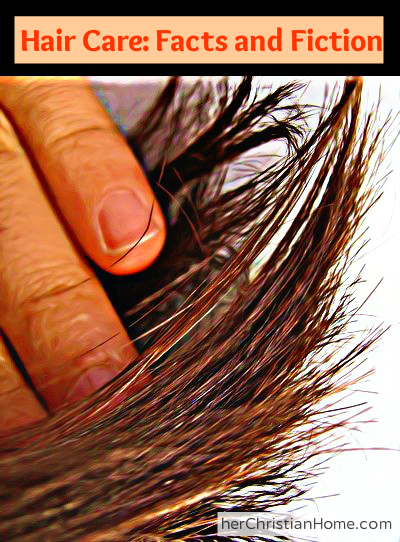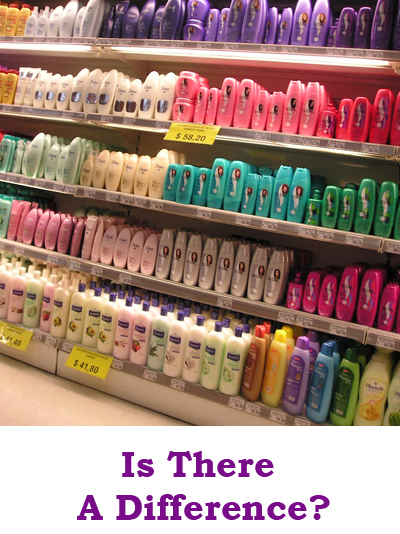“But if a woman have long hair, it is a glory to her: for her hair is given her for a covering.”
~ I Corinthians 11:15 kjv
Common Hair Care Facts and Myths
There’s a ton of myths, trends, old wives’ tales, (
and some real facts) out there about hair care. So, I’m going to share with you a little bit about what’s the real deal and what’s not.
FAQ:
1. Should I brush my hair for 100 strokes before going to bed every night?
If you’ve ever seen a Victorian-era brush and mirror set (and that’s the era from which this advice hails), then you can easily picture a lady with long hair brushing it out carefully with the wide, densely-bristled brush. But — those were natural, soft bristles, and her hair was likely down to her knees. In addition, women in those days didn’t wash their hair very often, and brushing appeared to “smooth” the hair by working the oil through it and down to the roots.
Today, this advice is considered outdated at best and damaging at worst. Brushing too often in this day and age of super-clean, product-covered, blow-dried hair and plastic hair brushes can lead to hair breakage.
2. Do I lather, rinse, repeat (until you hear the “squeak”)
Were you told to wash your hair, rinse it, and then wash again? Some shampoo bottles still tout this advice, but it’s a myth
(and a good ploy to sell more shampoo). You only need to wash your hair once and rinse. And as for that “squeak” that your hair is supposed to make that says it’s clean…well, experts warn that this is the equivalent of your hair screaming ouch! Hair that’s squeaky-clean is devoid of all natural oils, which makes it prone to be dry with brittle ends.
3. Should I pluck out my gray hairs? Or will that make more grow back?
There’s advice floating around that says if you pluck out gray hairs, you’ll get more than one gray hair in its place. This isn’t true. If you pluck hair of any color all you end up with is
less hair!
4. If you smoke, your hair will turn gray and fall out
This is partly true. Smokers are statistically more likely to have gray hair than those who don’t smoke, and smokers are also more prone to hair loss.
5. Lemon juice will bleach your hair
False…somewhat. Lemon juice won’t bleach your hair, but it can exaggerate highlights. You need to expose lemon-juice-spritzed hair to the sun repeatedly for it to work.
6. Natural hair products don’t have any chemicals in them, right?
Some do and some don’t. You really have to take time to read the ingredient lists and do your research. Unfortunately, you really can’t trust labels. “Natural” is a pretty general term with lenient guidelines.
Hair Health and Growth: Facts and Fiction
1. Fact or Fiction: Hair Grows Faster If You Trim It Regularly
This one’s fiction. Your hair is dead on the ends, so you can’t “stimulate” growth by trimming. But this myth certainly is persistent! One probable reason why this myth has stuck around is that trimming your hair can make it look thicker immediately, and keeping it trimmed can give the appearance of health and thickness. And when the ends are even and splitting is under control with regular trimming, hair can appear to grow faster. But it’s all about looks; your hair isn’t doing anything different at the roots if you trim it often.
2. Fact or Fiction: Straight Hair Grows Faster
Fiction. Once again, this is all about appearances. Straight hair appears to grow faster because it’s taking a straight route downwards! Wavy and curly hair curve around before heading down. Think of a spiral staircase – it takes a lot more steps in a spiral staircase than it does a straight one to cover the same vertical space. If you straighten out the spiral stairs, they’ll cover a lot more length; if you coil up straight stairs, you’ll come up short.
3. Fact or Fiction: Taking Vitamins Helps Your Hair
This is fact. Good nutrition promotes healthy hair. And to get those nutrients into your hair, you need to consume them. This leads to the next fact or fiction question…
4. Fact or Fiction: Vitamins in Shampoo and Conditioner Make Your Hair Healthier
Fiction. While the vitamin-infused shampoo or conditioner you’re using may make your hair appear healthier, your hair does not get vitamins from shampoo or conditioner. Hair is not living tissue once it comes out of the follicle, so nutrients in your hair need to be delivered via your bloodstream while the hair is being formed in the follicle.
5. Fact or Fiction: Brushing Your Hair More Often Will Make It Grow More
This is mostly fiction, but there’s a little fact here. While it’s not true that brushing more frequently will make your hair grow more or grow faster, using a natural bristle brush can help massage and stimulate your scalp and promote healthy hair. A good balance here is to brush your hair only when necessary, and when you do, use a natural bristle brush.
6. Fact or Fiction: The Right Product Can Repair Split Ends
Despite all the ads that promise to “repair” your split ends, this one’s fiction. Once your hair is split, it’s split. Certain products can hide the appearance of split ends temporarily by sealing the splits together. But there’s no way to mend a split hair like a broken bone.
Thinning Hair – Facts and Stats for Men and Women
Women in particular may find hair loss traumatic, because it’s not considered to be a “normal” part of aging. But what causes hair loss? How many people really suffer from it? And does it indicate any underlying health issues?
1. Men versus Women
Hair loss associated with aging is often considered a “male” problem. But about 40% of hair loss sufferers are women, sources say, and almost half of all women experience hair loss as a hereditary problem. To put it another way, 35 million men in the US experience hair loss, and 21 million women. So this is not just a guy thing.
2. Does Stress Cause Hair Loss?
Actually, most experts agree that stress is not a significant cause of thinning hair, particularly for men. It may play a role in female hair loss, but it’s not likely to be a significant cause of thinning hair.
3. What about Heredity?
Most sources agree that heredity is one of the big culprits in hair loss. Some experts go so far as to say it accounts for almost 80% of male hair loss. Heredity can affect women’s hair, too, but it is not always straightforward. This is because hair loss in women may have some other causes, and those other causes may or may not be hereditary.
4. Hormones
An underactive thyroid (hypothyroidism) is a major cause of hair loss in women. There are other possible hormonal causes of hair loss, too, such as the decrease in estrogen that occurs in menopause or the hormonal shifts that happen a few months after giving birth. It’s worth checking in with your doctor or other health professional if you think hormonal imbalance is playing a role in your hair loss.
5. Possible Underlying Health Issues Indicated by Hair Loss
* Iron deficiency
* Deficiency in other vitamins
* Too much vitamin A
* Alopecia areata, which is an autoimmune disorder that manifests as hair loss
6. How You Treat Your Hair
While hair is essentially dead tissue once it comes out of the follicle, how you treat your hair can affect its thickness. For example, harsh pulling and ripping at tangles with plastic bristle brushes can damage hair and make it appear thin by tearing up the ends. Harsh styling treatments can also cause hair breakage. Experts suggest using a natural-bristle brush that is gentle on the hair and massages the scalp.
7. The Role of Diet and Nutrition
Both men and women can benefit from a healthy diet, and their hair can, too. Sources say that getting plenty of healthy fats is important, as is taking an age-appropriate, easily absorbed vitamin. Eat lots of fresh fruits and veggies for nutrients and fiber, and exercise regularly. Exercise helps get the circulation going everywhere, including your scalp.
What Your Hair Says about Your Health…
1. Know Your Own Hair
Because everyone’s hair is different, it’s good to know your own hair. When you get your hair cut, talk to your hairdresser about your hair’s texture and thickness, and what he or she thinks about your hair. You’ll know if there have been changes, and whether or not those changes are normal for your age and lifestyle. (For example, it’s normal for a woman to lose a lot of hair a few months after giving birth, and it’s normal for everyone’s hair to get a bit thinner as they age.) So knowing what’s normal for your head is important if you’re going to discern changes.
2. Shedding
Another tip for knowing normal: it’s considered normal to shed up to 100 hairs a day. According to experts, your hair follicles are about 90% active and 10% “resting” at any given time. The hair is constantly replacing itself, in other words. Brushing your hair regularly can help you keep a handle on how much you’re shedding and whether or not there is an unusual increase in hair loss.
3. Vitamin Deficiencies
Some health experts point out the role of iron in hair strength and thickness, and sometimes suggest iron supplements or even infusions for people with severe hair loss. Often, the increase in iron helps stop hair loss and promote new growth.
It’s important to get enough
vitamin B12, too, as that helps you absorb iron.
4. Too Many Vitamins
Did you know that excessive vitamin A may cause hair loss? While vitamin A is essential for hair health, the irony is that too much of it can promote hair loss. This is why some vitamin A-based acne treatments list hair loss as a possible side effect.
Sources say that you should take in
no more than 10,000 IUs of vitamin A daily. But the need for this vitamin varies from individual to individual, so it’s a good idea to consult a health professional about your vitamin A needs if your hair seems to be “telling” you something!
5. Thyroid Conditions
Thinning hair may indicate a thyroid problem, usually too little thyroid hormone (hypothyroidism). Sometimes, with hypothyroidism, the hair doesn’t fall out so much as it becomes thin and limp. This is definitely time to seek a doctor who can give you a thyroid test to show whether or not you’re deficient in this hormone.
6. Lack of Biotin
Brittle hair may indicate that you need more biotin. Foods like eggs, dairy products, and liver contain biotin, which has become known lately as a hair-health promoting nutrient.
The bottom line is, your hair is part of your body, and
a healthy body tends to have healthy hair! Even if your hair is thin or fine naturally, it’s still a good idea to keep an eye on it to see if any changes in hair loss or texture are signaling a health issue.
Expensive Shampoo and Conditioner versus Cheap…
You’ve seen those bottles of shampoo and conditioner that sell for $20 and up. And then you’ve seen those $1.89 bottles at your local retailer. It’s hard

not to wonder if the difference in quality is really that significant.
Is there really a difference between the expensive shampoo and conditioner and the cheap stuff?
First, it helps to know just what shampoo and conditioner is all about.
Shampoo
The purpose of shampoo – no matter what the advertisers say – is to wash your hair. It’s supposed to clean your hair and scalp, removing dirt, oil, dust, and whatever other matter you don’t want there. Like washing your hands, washing your hair is supposed to clean it. This may seem super-obvious, but think about it – advertisers have everyone believing that hair care is all about what the shampoo puts into your hair. If the shampoo has any cleaning power at all, then it’s not leaving much of anything behind.
Conditioner
The purpose of conditioner is to add moisture to your hair, and other ingredients that help reduce frizz. Conditioner can also protect your hair from damage to an extent by making it more supple. That’s really it. So why do some conditioners cost a fortune? Like shampoo, it has a lot to do with the ingredients…
Ingredients: Vitamins, Minerals and Proteins
A lot of shampoos and conditioners are more expensive because they have so many “special” ingredients. From exotic oils and fragrances to magical ingredients said to repair split ends, shampoos and conditioners all seem to be trying to outdo each other. The more of these ingredients are added, the higher the price.
So How Can You Find a Quality Shampoo and Conditioner?
Even if you are confident that you don’t want to spend on fortune on shampoo and conditioner, quality is still important and it does matter. But you don’t have to spend a lot to get good quality. For example, some sources suggest
steering clear of shampoos and conditioners with sodium lauryl sulfate, ammonium lauryl sulfate, sodium laureth sulfate, and the like. These are considered harsh detergents that can damage hair.
Other sources say that you should
avoid dimethicones (and any chemical ending in “
cone“) in your shampoo and conditioner. But you can find good quality products that do not have these chemicals or the harsh detergents. Just read the ingredient lists in the inexpensive shampoo and conditioner aisle!
To sum it up: Using a quality product to clean and condition your hair makes sense, but spending a whole lot of money on “miracle” products doesn’t.]]>

 not to wonder if the difference in quality is really that significant.
Is there really a difference between the expensive shampoo and conditioner and the cheap stuff?
First, it helps to know just what shampoo and conditioner is all about.
not to wonder if the difference in quality is really that significant.
Is there really a difference between the expensive shampoo and conditioner and the cheap stuff?
First, it helps to know just what shampoo and conditioner is all about.



2 Comments
Missy
I had a friend who was using lemon juice as a rinse, and I asked her if she has been going outside immediately afterwards, and she said yes, because her hair had lightened considerably, it was funny.
Rhonda White
Yes, that would indeed do the trick…sunlight and lemon makes quite a combination… I’ve seen girls do that for highlights. I have dark hair and not sure how it would turn out… I might end up with an odd color, so I’m not trying it. ha ha!